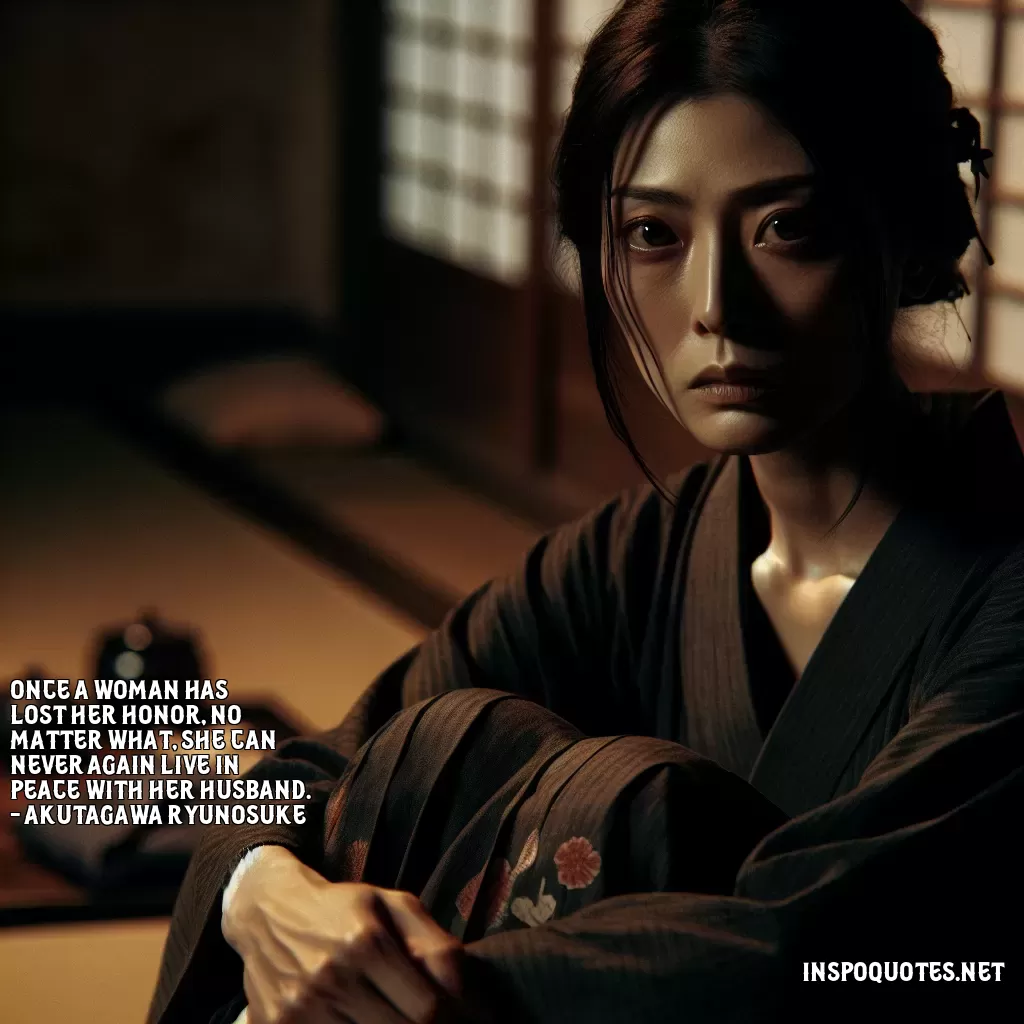
Once a woman has lost her honor, no matter what, she can never again live in peace with her husband. - Akutagawa Ryunosuke
Author: Akutagawa Ryunosuke
👁️ 10 views

Once a woman has lost her honor, no matter what, she can never again live in peace with her husband. - Akutagawa Ryunosuke
👁️ 10 views
The quote by Akutagawa Ryunosuke, "Once a woman has lost her honor, no matter what, she can never again live in peace with her husband," reflects on traditional views surrounding honor, fidelity, and relationships, particularly within the cultural and historical context in which Akutagawa wrote. It suggests that a woman's honor is closely tied to her fidelity and reputation, and once tarnished, it leads to an irreversible breach in the marital relationship. In this context, "honor" often refers to sexual fidelity or purity, concepts that were highly emphasized in many societies, including early 20th century Japan, where Akutagawa was writing. If a woman were to lose her honor—perhaps through infidelity or actions deemed dishonorable—she would not only face societal judgment but also potentially a permanent discord with her husband. This can be seen as a reflection of deep patriarchal values where a woman's worth was often linked to her honor and her ability to maintain a marriage peacefully. The quote indicates that once that trust is broken, the damage is seen as irreparable, suggesting a marriage can no longer function harmoniously. This perspective highlights how traditional gender roles and expectations imposed constraints on women, often leading to unequal judgments compared to male counterparts. Therefore, it speaks to broader themes of societal pressure, gender inequality, and the difficulty of reconciliation once societal norms deem an action as unforgivable. While this perspective may not align with contemporary views that allow for forgiveness and rebuilding trust, it offers insight into historical attitudes toward gender and relationships.
Quote By: Akutagawa Ryunosuke
He graduated from the prestigious University of Tokyo, where he studied English literature. Akutagawa began his writing career in the early 1910s, publishing his first story, "Rashomon," in 1915. This story, which narrates a crime from multiple conflicting perspectives, reflects Akutagawa's fascination with the elusiveness of truth and the subjective nature of reality. His unique narrative style, characterized by psychological depth and intricate storytelling, quickly garnered attention.
One of his most celebrated works, "In a Grove" (1922), showcases Akutagawa's innovative approach to narrative structure and character development. The story also served as the basis for Akira Kurosawa's acclaimed film "Rashomon," which further solidified Akutagawa's place in the global literary tradition. Throughout his career, he published numerous short stories, essays, and critiques, with notable works including "The Nose," "Hell Screen," and "Kappa."
Despite his literary success, Akutagawa struggled with personal issues, including depression and anxiety. These struggles often found their way into his writing, resulting in profound and sometimes dark reflections on life and the human condition. In 1927, at the age of 35, he tragically took his own life, a loss that shocked the literary community in Japan and beyond.
Akutagawa’s legacy endures, as he is regarded as a pioneering figure in Japanese literature. His ability to weave intricate psychological narratives continues to influence writers today, and his works remain essential reading in understanding modern Japanese literature and its exploration of the human psyche. His influence is particularly felt in the genre of short fiction, where his innovative techniques and thematic concerns resonate with contemporary writers around the world.